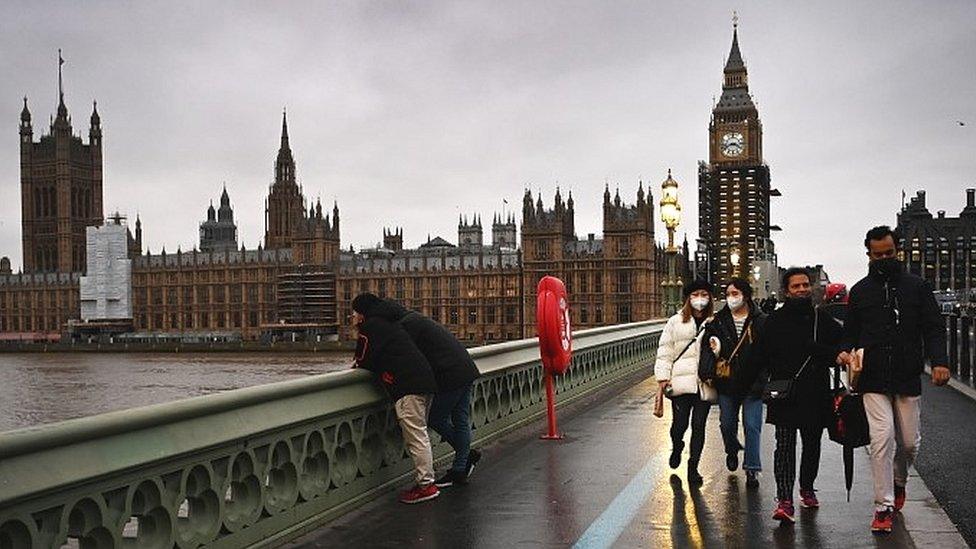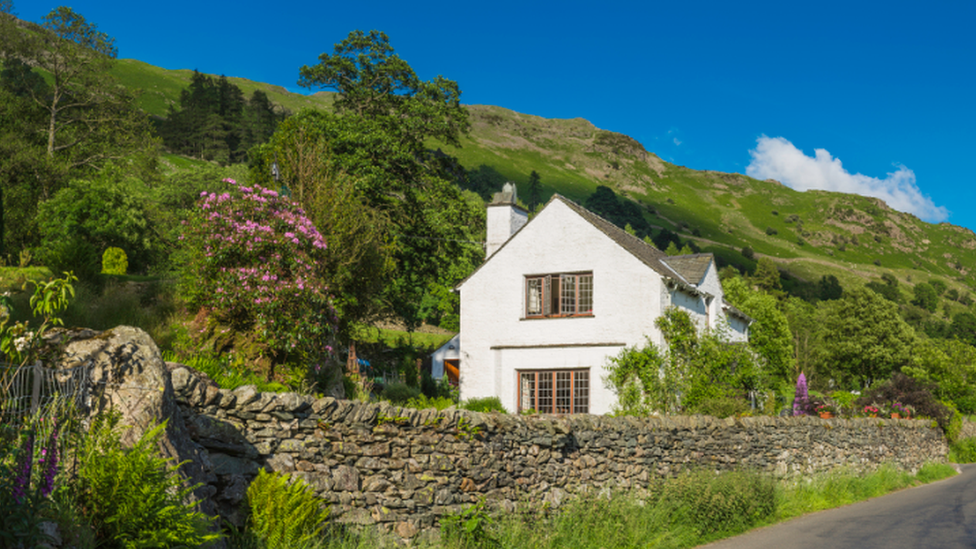What's coming up in Parliament next week?
- Published

On paper, parliamentarians will be eased gently into 2022 with a couple of days of humdrum debates and routine legislating, but with a real sense that the political balance is tipping, expect the most significant action to come in the form of government statements and urgent questions - and a lively PMQs.
A ministerial, possibly prime ministerial, update on the pandemic looks a near certainty, and given the Conservatives' internal angst around the possibility of more restrictions, the latest figures will doubtless be crawled over in great detail, and the forms of words used by ministers scrutinised syllable by syllable.
Expect tension levels to increase sharply if the government announces it's clearing the agenda to bring in new Covid regulations.
Further statements or urgent questions around the new French travel restrictions and the situation in Ukraine also seem highly likely - indeed, there are enough subjects for the post-recess questioning to extend to Thursday, too.
Meanwhile, it's a fairly quiet week on the Committee corridor, partly because most committees are beginning a new cycle of inquiries and reports, and this typically means a lot of private planning meetings, and a few discursive evidence sessions with expert witnesses, to ease them into their new subjects of interest.
Watch out, too, for the arrival of Helen Morgan, the Lib Dem victor of the North Shropshire by-election - with as much in the way of photo-opportunities and chamber theatre as her party can manage, as it makes the most of its victory lap.
Wednesday 5 January
The Commons opens 2022 (at 14:30) with half an hour of Wales questions, followed by Prime Minister's Questions, to be followed by at least one post-recess government statement.
There's certainly room, given that the day's main law-making action looks pretty thin.
The day's Ten Minute Rule Bill, from Conservative Richard Holden, would extend automatic pension enrolment to 18-year-olds.
The main scheduled debate is on the Second Reading of the fabulously uncontroversial Public Service Pensions and Judicial Offices Bill, which makes changes to public service pension schemes to ensure that all eligible public service workers "have access to high-quality defined benefit schemes on a fair and equal basis".

MPs will debate deforestation in the Amazon
In Westminster Hall there are debates on how the justice system deals with allegations of historical sex abuse (11:00); deforestation in the Amazon (14:30); and immigration requirements for non-UK armed forces personnel. That last one is led by Labour's Dan Jarvis, who co-sponsored an unsuccessful amendment to the Nationality and Borders Bill on that same issue.
Committee action includes Work and Pensions (13:30) taking evidence on the plan for jobs and employment support; Environmental Audit (15:00) quizzing experts about technological innovations and climate change; and Women and Equalities (16:20) talking to legal experts about the rights of cohabiting partners.
In the Lords (15:00) the 40-minute question time ranges across London being the most congested city in the world (from former Transport for London deputy chair, Lord Moylan) and ensuring that the victims of building defects are not liable for the cost or rectifying them.
The main event is the Second Reading of the Nationality and Borders Bill - the kind of measure peers can be expected to make a serious attempt to rewrite, although they would not normally attempt to make detailed changes until Report Stage, in February. Listen out as they put down markers for possible changes later in the process.
Thursday 6 January
The Commons opens (09:30) with 40 minutes of transport questions, followed by a mini-question time for Attorney General Suella Braverman, and the usual statement from the leader of the House on the following week's Commons agenda.
The main debate, chosen by the Backbench Business Committee, is on Russian grand strategy. The idea is to highlight the nature of Russian policy as a hybrid war against the West, encompassing actions in Ukraine, re-arming Serbs in the Balkans or the occupation of Crimea.
Conservative Sir Bernard Jenkin, who applied for the debate, said Western governments were divided and focused on their economic problems, while President Vladimir Putin had put his country on a war footing, to intimidate the West. Ministers will face questions on the UK and allied response.

What impact are holiday lets having on the countryside?
In Westminster Hall there will be two debates; former Lib Dem leader Tim Farron leads one on second homes and holiday lets in rural communities (13:30), and then (15:00) the DUP's Jim Shannon leads one on the Afghan Citizens' Resettlement Scheme.
In the Lords (11:00) ministers field questions on the number of people kept in hospital because there are no places for them in social care homes, vaccine distribution, and the effect of increased night-time working on public health.
The day's main debates will be on subjects selected by crossbench peers. First, Lord Alton leads a debate on an urgent international response to the estimate by the United Nations High Commissioner for Refugees that 82.4 million people are displaced worldwide.
Then Baroness Cavendish of Little Venice has a debate on the increasing numbers of "skeleton bills" and the associated use of delegated powers - this is a regular complaint about new laws which grant ministers a power to make regulations on an issue, when the real details of what they're trying to do will not emerge until the regulations are published, at which point, Parliament has very little opportunity to debate them, and none to amend them.
Between them will be a one hour mini-debate - the subject has not been fixed at the time of writing.
Friday 7 January
Neither House is expected to sit.
